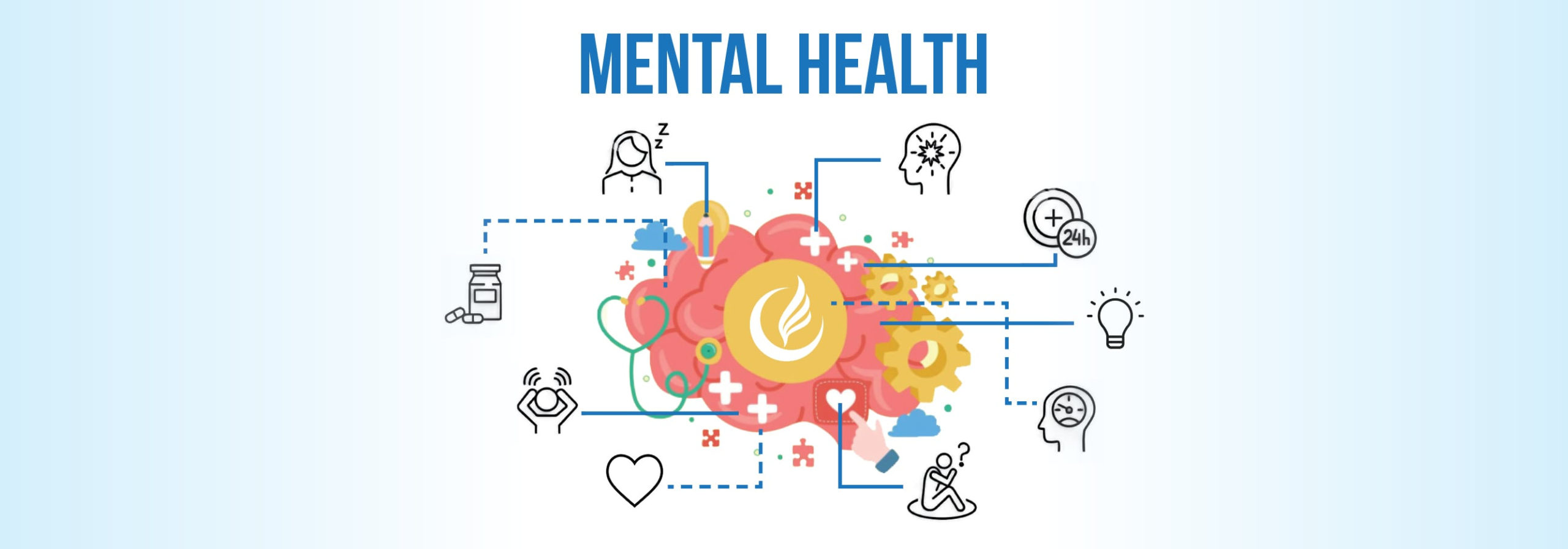IMANA Mental Health
With one in five U.S. adults experiencing some form of mental illness, it’s difficult to dismiss the need for more awareness around mental health. The stigma associated with mental health often prevents affected individuals from getting the proper help and treatment on their journey to a better well-being.
IMANA recognizes this need and aims to improve awareness and access for mental health services in the Muslim community through the launch of its free Muslim mental health professionals directory and list of resources. Both education and advocacy are crucial aspects of breaking down barriers that surround mental health to support those affected and better serve our community.

Mental Health FAQ
What is mental health and mental illness?
Many factors can affect mental health along the way, including:
- Life experiences (any trauma or abuse)
- Biological factors (your genes and biochemistry)
- Family history of mental health problems
Mental illnesses are health conditions that involve changes in emotion, thinking, or behavior (or any combination of these). Distress and/or problems with functioning in social, work, or family activities are all associated with mental illness. Severity of most illnesses exists on a spectrum ranging from acute to severe.
It is important to remember that mental illness does not discriminate and is very common; nearly one in five U.S. adults experience some form of mental illness in a given year. Mental illness is not something to be ashamed of. It is a medical problem, just like heart disease or diabetes, and is very much treatable with proper help.
What are the types of mental health professionals?
- Psychologist (Ph.D., Psy.D., Ed.D.)
- Psychiatrist (M.D./D.O.)
- Licensed Mental Health Counselor (LMHC)
- Licensed Professional Counselor (LPC)
- Licensed Clinical Professional Counselor (LCPC)
- Licensed Marriage & Family Therapist (LMFT)
- Licensed Clinical Social Worker (LCSW)
- Licensed Master Social Worker (LMSW)
*Keep in mind that some license names can vary by state and may also overlap. We encourage you to research how these terms are defined with respect to your localities.
For religious guidance, you may reach out to your local Imam or Sheikh. However, there may be a gap in knowledge between an Imam and a mental health professional due to level of training on the topic. Khalil Center is a great starting point for those seeking psychology rooted in Islamic principles.
Where can I find a mental health professional?
The Islamic Medical Association of North America has launched a directory of mental health care providers in North America to help people find a professional closest to them. Follow the link below to get started:
> Find a Therapist
When is the right time to seek help?
There is no correct answer for when it is the “right time” to start therapy. Most people choose to start when they are experiencing a crisis or are at a breaking point. However, you can also start therapy:
- Before reaching a crisis
- When you are going through life and personal changes
- When you want to learn more about yourself
- When you want to start having better relationships
Common warning signs and symptoms
Distinguishing between what may be expected behaviors and what might be signs of mental illness isn’t always the easiest. Each illness has its own symptoms, but the following list encompasses what is considered to be common signs of mental illness in adults and adolescents:
- Dramatic sleep or appetite changes; decline in personal care
- Feeling excessive sadness or lows
- Excessive worrying or fear
- Rapid or dramatic mood changes, including uncontrollable “highs” or euphoria
- Confused/illogical thinking, problems concentrating/learning
- Avoiding friends or social activities
- Prolonged/Strong feelings of irritability and/or anger
- Apathy; loss of initiative, desire or drive to participate in any activity
- Difficulty perceiving reality (delusions, hallucinations, feeling disconnected)
- Drop in daily functioning (in school, work, social activities, etc.)
- Suicidal thoughts or intent
- Thoughts or intent of harming others
- Overuse of substances like drugs or alcohol
- Unusual or uncharacteristic behavior
In younger children, symptoms present more behaviorally, such as:
- Changes in school performance
- Hyperactive behavior
- Frequent disobedience or aggression
- Frequent nightmares
- Frequent temper tantrums
- Excessive worry or anxiety
I'm afraid my personal issues will be shared with the community. How do I ensure my privacy and safety?
Confidentiality is a crucial and respected part of the psychology code of ethics. Professionals in the mental health field are taught to take your privacy seriously and to create an environment where you feel safe and comfortable.
Additionally, the Health Insurance Portability and Accountability Act (HIPAA) contains a privacy rule that creates national standards to protect individuals’ medical records and personal health information, including information about psychotherapy and mental health.
At your first visit, you should be given written information explaining privacy policies and how your personal information will be handled. This information will explain that in some cases, there are exceptions to the privacy rule.
Have a question? Get in touch.
Locations:
Virginia: 9681 Main Street, Suite B, Fairfax, VA 22031
Phone:
202-559-3765
Fax:
630-932-0005
Email:
IMANA is a registered 501(c)(3) nonprofit organization. All donations to IMANA are tax exempt. Tax ID: #36-4166125
Stay up-to-date with IMANA's newsletters and never miss a thing!
By submitting this form, you are consenting to receive marketing emails from: . You can revoke your consent to receive emails at any time by using the SafeUnsubscribe® link, found at the bottom of every email. Emails are serviced by Constant Contact

